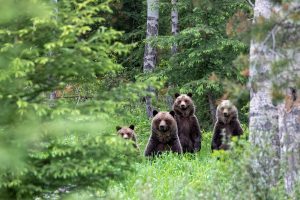
News Release: Controversial Hunt Returns for Alberta’s Threatened Grizzly Bears after Ministerial Order
July 9, 2024
- •
- •
- •
Alberta’s decision to allow grizzly bears to be hunted again despite being a threatened species under the Wildlife Act is unacceptable and must be reversed immediately. The Wildlife Regulation was altered without public consultation or legislative review by Forestry and Parks Minister Todd Loewen and published on June 29 in the Alberta Gazette. The grizzly bear hunt was suspended in 2006 after the grizzly population in Alberta dwindled to fewer than 700 bears on provincial lands in 2004. Grizzly populations have since been recovering, but human-caused mortality remains the leading cause of grizzly bear death. In 2021, Alberta Environment and Parks stated that the province had between 856 and 973 grizzly bears.
The changes to the Wildlife Regulation that enable the grizzly bear hunt, published in the Gazette, state that grizzly bears that are “involved in a human-bear conflict situation” or “in an area of concern” may be authorized to be hunted.
Human-wildlife conflict is a challenge that must be addressed by the appropriate wildlife officials. If a bear threatens human safety, appropriate actions must be taken by professionals, not trophy hunters. Although there are cases where bears may have to be euthanized, this should be a last resort that is only used when a bear poses an imminent safety risk.
Many cases of bear habituation to human food are caused by the actions or negligence of people, resulting in bears being killed. This new policy incentivizes people interested in hunting grizzlies to allow bears to become habituated, creating a hunting “opportunity.” Human-wildlife conflict can be tragic for both bears and people, and should not be viewed as an opportunity for trophy hunting.
Additionally, it is unclear what defines “an area of concern,” and therefore that term could apply to anywhere bears and people overlap. The presence of people and human footprint in bear habitat has only increased over the decades. People and bears share this province and we must allow them space to live and thrive on the landscape.
The province’s only human-wildlife conflict specialist retired in 2022 and was not replaced. This role focused on preventing conflicts between people and bears. Rather than enacting a controversial grizzly hunt, Alberta should hire regional large carnivore conflict biologists, which is called for in the 2020 Grizzly Bear Recovery Plan.
“Hunting is not an acceptable management approach for a threatened species,” says Devon Earl, AWA conservation specialist. “Grizzly bears have a very slow reproductive rate, and trophy hunting could undo all the recovery of the last decade.”
John Marriott, co-founder of the Exposed Wildlife Conservancy adds, “This seems like a short-sighted decision intended to appease Minister Loewen’s ties to the Guide-Outfitting and Trophy Hunting industries and lacks any public integrity. Why wasn’t the public consulted on this? Why weren’t grizzly bear researchers involved in this decision? The science on grizzly bears very clearly does not show a beneficial link between hunting and conflict resolution, so why are we risking grizzly bear recovery for a few hunters to have trophy rugs on their walls?”
If you can, please consider sending a letter to the Minister of Forestry and Parks. Feel free to borrow this letter structure:
Dear Minister Loewen,
I am writing to ask that you immediately reverse the changes to the Wildlife Regulation that allow hunting a grizzly bear that is not accompanied by a cub and is involved in a human-bear conflict or is “in an area of concern”.
Grizzly bears are a threatened species in Alberta, and hunting is not an acceptable management approach. If a bear poses a public safety threat, the situation must be handled by a qualified wildlife officer, not any adult resident who is otherwise eligible to obtain a recreational hunting license.
In addition, “area of concern” is not defined, and therefore there is a possibility that bears anywhere on public lands could be targeted. Albertans value having grizzly bears on the land, and we must learn to coexist with them responsibly.
These changes are likely to reverse the progress that has been made towards grizzly bear population recovery since the hunt was suspended in 2006 and are unlikely to protect public safety.
Sincerely,
YOUR NAME
Send your email to: fp.minister@gov.ab.ca, and feel free to cc us and your MLA (you can find them and their contact here.)
Thank you for taking action to protect Alberta’s iconic grizzly bears!
Facts:
- The Alberta Government’s Endangered Species Subcommittee recommended in 2002 that the grizzly bear should be designated a threatened species due to very low population size (fewer than 1000 individuals) and dispersal and exchange with adjacent populations being limited.
- Human-caused mortality and habitat fragmentation resulted in the grizzly bear population in Alberta dwindling to fewer than 700 individuals on provincial lands in 2004.
- Between 1972-1996, a total of 838 human-caused grizzly bear deaths were recorded.
- The Alberta Premier received 1300+ letters protesting the grizzly bear hunt in 2004.
- The Eastern Slopes Grizzly Bear Project in 2005 reported that grizzly bears in the Bow River watershed had the slowest reproductive rate of any bear population studied at the time in North America.
- The grizzly bear hunt continued until 2006.
- Despite the recommendation from the Endangered Species Subcommittee, grizzly bears were not officially listed as threatened until 2010.
- According to government of Alberta data, the greatest source of human-caused grizzly mortality on provincial lands from 2010-2019 was illegal hunting, followed by vehicle collisions, then euthanasia.
